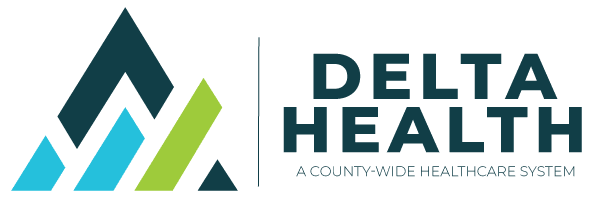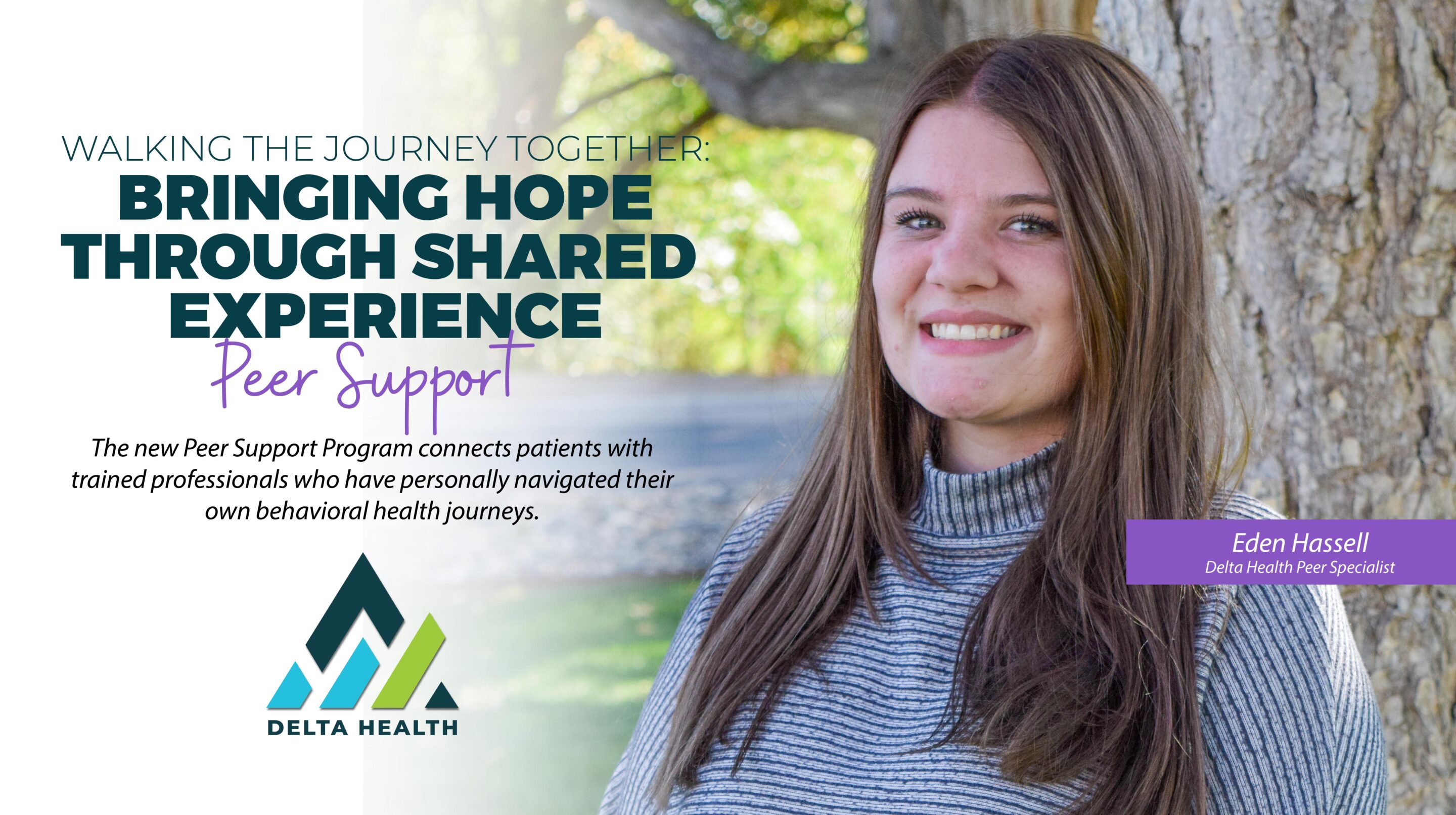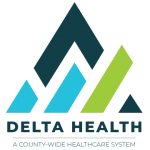
Through the support of a grant from the Rocky Mountain Health Foundation, Delta Health launched the program in March 2024 with the onboarding of two full-time and one part-time specialist. The Peers receive referrals from physicians or nurses for patients throughout the hospital who are struggling with a range of conditions. They offer support, advocacy and vital connections to community resources.
For Eden Hassell, one of Delta Health’s Peer Support Specialists, connecting with her patients through her lived experiences with behavioral health and substance abuse allows her to make an impact.
“There are many evidence-based studies that show how beneficial peer-to-peer relationships are for patients,” said Eden. “Patients feel more understood and it connects us on a human level. We are two people talking to each other and I’m getting them what they need.”
Originally from the front range, Eden was pursuing a degree in Human Services when she stumbled on Peer Specialist work. She was thrilled to find work that allowed her to use her experience to help others.
“When the pandemic hit, I decided I was going to take a break from school and work,” said Eden. “When I searched jobs and this one came up I thought it was great to have a position that was OK with me bringing up my past. I got my start at an inpatient facility in Greeley and fell in love with the work.”
Eden approaches connecting with her patients as a chance to meet them where they are with pure acceptance. She said she knows that in some cases, she might be the only person in the patient’s life showing them empathy and understanding.
“We all have an agenda of what we want someone to do,” said Eden. “If it’s substance abuse it’s easy to go in and say, ‘stop drinking,’ but instead, I am going to ask them what they want to do about the situation. I am going to ask them what outcomes they are hoping to achieve. From there I can figure out how I can help. Either way, I am going to be side-by-side with them on their journey.”
Growing up in foster care, Eden experienced a lot during years of moving around and struggled with her mental health. She was experiencing post-traumatic stress disorder (PTSD), anxiety and depression. After negative experiences trying to seek help from school counselors and spending time in different mental health facilities, Eden wanted to be someone who could help people have a better experience.
“I felt really alone, and I felt like I didn’t have anyone to talk to,” expressed Eden. “Luckily, I did find a good therapist and she did amazing things for me. I would not be where I am without her. She also motivated me to help other people. I didn’t and don’t want other people to have to go through what I went through.”
At the core of the Peer program are the values of integrity, service excellence and compassion. Since the program began in March, the Peer Support Specialists have met with over 540 patients throughout the hospital. The Peers also maintain a 1-week success rate call back of 87.43%. This has strengthened relationships and patient success and support.
The stigma surrounding behavioral health care remains, but through programs like this, those barriers are slowly coming down.
“A lot of people have been judged for their mental illness, but when they’re talking to someone who they know has experienced something similar – they open up,” said Eden. “Working in a rural community, the stigma is still there about getting help – but more people are coming around to the idea that you don’t have to do this alone. It is OK to ask for help, and mental health is just as important as physical health. They’re connected.”
Working closely with community partners is also a large part of what Peers do. They can expedite connections to psychiatric care, book appointments directly with Delta Health outpatient therapists, and even invite third-party organizations including the Crisis Prevention Unit (they provide ongoing resource case management) and Porch Light (they offer Medication Assisted Therapy for addition) for warm handoffs here at the hospital.
“This added level of support and accountability saves lives while keeping people connected to local resources whenever possible,” said Dan Panzarella, LPC, LAC, and Manager of Inpatient Behavioral Health for Delta Health. “Because of the work of the Peers, our patients receive comprehensive care and compassionate guidance on the next steps while our teams benefit from an additional level of support.”
Integrated Behavioral Health Programs are an important part of value-based care and approaching whole-person care. At the beginning of 2024, after changes with local behavioral health resources, Delta Health recognized the importance of quickly expanding its services. Since then, they have also responded to the urgent needs of patients by adding multiple therapists to the existing primary care clinics and creating a new Behavioral Health Center.
In the long term, the hope is to continue expanding the Peer Support Specialist program within the hospital by adding additional staff to meet patient needs.
“We also hope our program can be a model for other hospitals,” said Eden. “We do a lot of data collection to show the impact we have made, and we want to show other hospitals how they can start and how important it is.”
Programs like this are vital to the patient experience. A few years ago, when living on the Front Range, Eden experienced a panic attack that sent her to an Emergency Department. She was worried and didn’t know what was happening to her. The team ran tests and she was told, ‘You just had a panic attack. You’re fine.’
“I remember feeling really embarrassed,” said Eden. “I had a lot of questions, and I didn’t feel hard or listened to. That experience showed me that while the doctor did a great job at figuring out what was wrong with me physically; his training was not in how to help patients with the mental health side of things. I keep that story in mind a lot. If I had encountered a Peer at the time, I would have felt heard and less ashamed in my experience.”
Peers at Delta Health provide compassionate, understanding care while increasing access to behavioral health support at the same time. Some of the other Peer services include mindful listening and empathetic support, coordinating crisis evaluations, depression and anxiety screeners, social determinants of health screenings, safety/relapse prevention and more.
“I think it’s awesome that Delta Health has this program,” said Eden. “Even though we are a small hospital, it’s personal here. That really makes a difference.”
More information on the inpatient and outpatient Behavioral Health services available at Delta Health can be found online at deltahealthco.org/behavioral-health/ or by calling 970.874.6008.
Eden lives in Delta with her husband who grew up in Montrose, who is currently an Outdoor Educator in Hotchkiss. Eden is a singer and a self-proclaimed ‘theater kid,’ and will be starring in an upcoming play at Magic Circle Players in Montrose. She loves anything artsy and outdoorsy. She also enjoys spending time with her two cats Watson and Zen.



